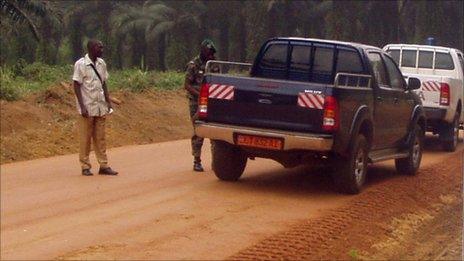Cameroon profile - Timeline
- Published
A chronology of key events:
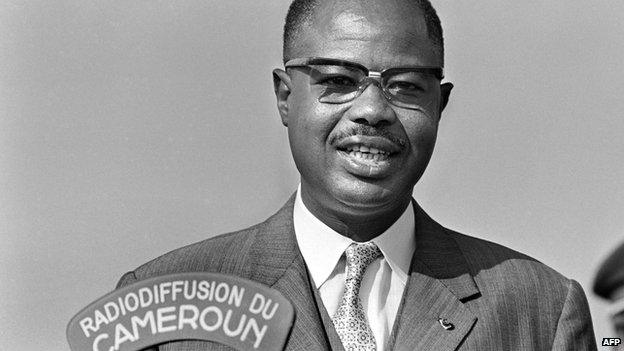
Ahmadou Ahidjo was Cameroon's first post-independence leader
1520 - Portuguese set up sugar plantations and begin slave trade in Cameroon.
1600s - Dutch take over slave trade from Portuguese.
1884 - Cameroon becomes the German colony of Kamerun.
1911 - Under the Treaty of Fez - signed to settle the Agadir Crisis Franco-German conflict over Morocco - France cedes territories to the east and south to Cameroon.
1916 - British and French troops force Germans to leave Cameroon.
1919 - London Declaration divides Cameroon into French (80%) and British administrative zones (20%). The British zone is divided into Northern and Southern Cameroons.
Independence
1960 - French Cameroon granted independence and becomes the Republic of Cameroon with Ahidjo as president.
1961 - Britain's Cameroons colonies divide between Cameroon and Nigeria after a referendum. A large-scale insurrection mars the country's first years of independence until it is put down in 1963 with the help of French forces.
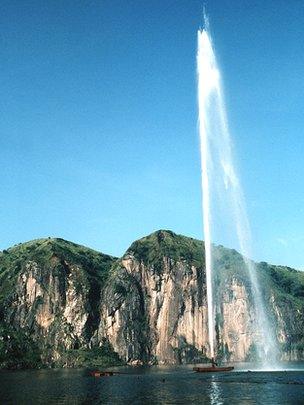
A 1986 release of carbon dioxide from Lake Nyos - seen being degassed in 2001 - killed 1,700 people
1966 - National Cameroonian Union formed out of six major parties and becomes the sole legal party.
1972 - Cameroon becomes a unitary state following a national referendum and is renamed the United Republic of Cameroon.
Paul Biya era
1982 - Prime Minister Paul Biya succeeds President Ahidjo, who resigns.
1983 - Mr Ahidjo goes into exile after President Biya accuses him of masterminding a coup.
1984 - President Biya elected to his first full term as president, changes the country's name to the Republic of Cameroon.
1986 - Discharge of poisonous gases from Lake Nyos kills about 1,700 people.
1992 October - Paul Biya re-elected in Cameroon's first multi-party presidential election.
1994 - Fighting between Cameroon and Nigeria flares up over disputed oil-rich Bakassa Peninsula.
1996 January-May - Further Cameroonian-Nigerian border clashes.
1996 May - Cameroon and Nigeria agree to UN mediation over Bakassa Peninsula.
1997 May - President Biya's party, the Cameroon National Democratic Movement (formerly the National Cameroonian Union), wins a majority of seats in parliament amid allegations of irregularities.
1997 October - President Biya re-elected in ballot boycotted by main opposition parties.
Corruption
1998 - Cameroon classed as the most corrupt country in the world by business monitor Transparency International.
2000 June - World Bank approves funding for oil and pipeline project in Cameroon and Chad, despite strong criticism from environmental and human rights activists.
2000 October - Catholic Church in Cameroon denounces corruption, saying it has permeated all levels of society.
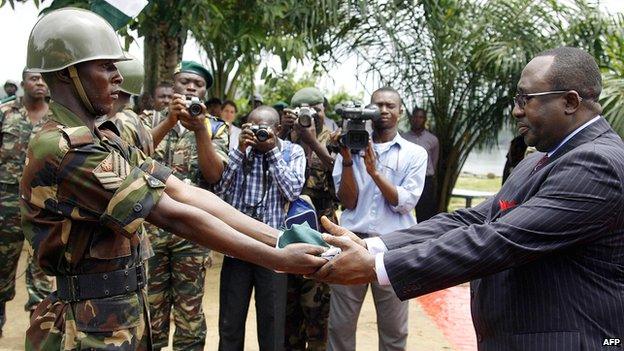
Nigerian soldiers withdrew from the Bakassi Peninsula in 2006, four years after the International Court of Justice ruled in favour of Cameroon in the two countries' territorial dispute
2001 June - Fears for Cameroon's environment increase, with Global Forest Watch reporting that 80% of the country's indigenous forests have been allocated for logging.
2001 October - Growing tension between government and separatists lobbying on behalf of country's five million English-speakers. Unrest results in three deaths, several arrests.
Bakassi ruling
2002 October - Ruling by International Court of Justice gives sovereignty of oil-rich Bakassi Peninsula to Cameroon. But Nigeria, whose forces occupy the area, rejects the ruling.
2006 June - Nigeria agrees to withdraw its troops from the Bakassi Peninsula to settle its long-running border dispute with Cameroon.
The Paris Club of major lending nations agrees to cancel almost all of Cameroon's $3.5bn debt.
2007 November - Suspected Nigerian militants kill 21 Cameroon soldiers in Bakassi Peninsula.
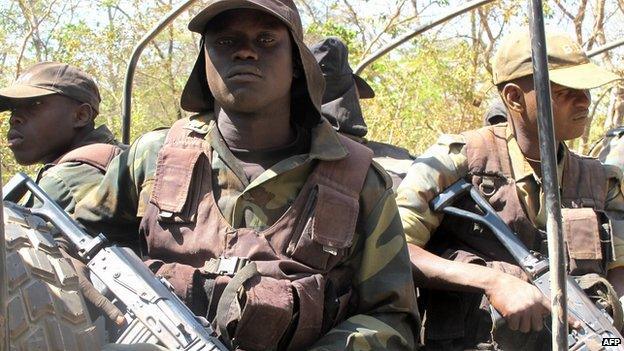
Cameroon vowed a tough approach on poaching after hundreds of elephants were massacred in Bouba Njida National Park in 2012
2008 February - A nationwide transport strike in protest at fuel costs turns into a series of anti-government demonstrations in the capital, Yaounde, leaving at least 17 dead.
Constitution amended
2008 April - Parliament amends the constitution to allow President Biya to run for a third term in 2011. The opposition condemns the move as a "constitutional coup".
2011 January - Cameroon secures Chinese loan to build deep sea port at Kribi, terminal of an oil pipeline from Chad.
2011 October- Paul Biya wins a landslide re-election as president, officially taking 78% of the vote. His opponents reject the result, alleging widespread fraud.
Boko Haram incursions
2013 February - A French family of seven is kidnapped by the Islamist group Boko Haram near the Nigerian border, and released two months later.
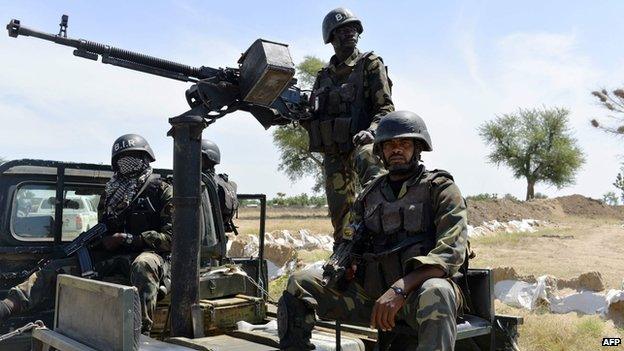
Cameroon troops have been deployed to counter Boko Haram raids from northern Nigeria
2014 January - A French priest kidnapped by Islamist gunmen in the far north of Cameroon in November is freed.
2014 May - Cameroon deploys about 1,000 troops to the border with northern Nigeria to counter a rising threat of incursions and kidnappings by Boko Haram.
2014 October - Twenty-seven hostages kidnapped by Boko Haram in Cameroon earlier in the year, including 10 Chinese workers and the wife of the deputy prime minister, are freed.
2015 January - Chad pledges military support for Cameroon against Boko Haram.
Anglophone protests
2016 November - Violent protests against the imposition of French in Anglophone parts of Cameroon.
2017 March-November - Unrest as Anglophone minority in north- and south-west regions continue protest action against perceived marginalisation.
2018 March - Two soldiers are killed in clashes with separatists in Anglophone areas, the latest of several deadly incidents in an insurgency related to the campaign for greater autonomy.
2018 October - President Paul Biya wins a seventh term in a vote marked by low turnout and voter intimidation.
- Published28 June 2011
